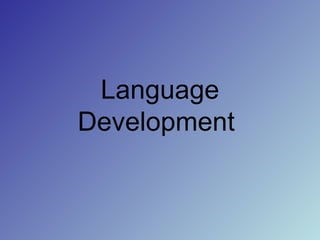
How Children Develop Language Skills
- 2. All children master their native language unless there is a severe deprivation or physical problem to interfere their language development.
- 3. How do children develop their language? • Children develop language as they develop other cognitive abilities by actively trying to make sense of what they hear, looking for patterns and making up rules. • In this process, built-in biases and rules may limit the search and guide the pattern recognition. • Reward and correction play a role in helping children learn language use, but the child’s thought processes are very important.
- 4. Language Development in the School Years • By the age of 5 or 6, most children master the basics of their mother language. • During the school years they should accomplish: • Pronunciation • Syntax • Vocabulary and meaning • Pragmatics • Metalinguistic awareness
- 5. Pronunciation • Majority of students in grade 1 have mastered most of the sounds in their mother language. • The j, v, th and z sounds are the last to develop. • Young children know a lot of words, but they prefer to use words that they can easily pronounce.
- 6. Syntax (order of words in sentences or phrases) • Children master the basics of word order very early. • Complicated forms such as passive voice take longer to master. • In grades 1 and 2, many children can understand passive sentences, but they do not use them in conversations. • During the lower primary grades, children also learn complex grammatical structures such as qualifiers and conjunctions.
- 7. Vocabulary and meaning • The average six year old has a vocabulary of 8000 to 14000 words, growing about 40000 by age 11. • Children in the early grades enjoy language games and jokes that requires playing with words. • Children in lower primary grades have trouble with abstract words such as justice or economy. They also may not understand subjunctive case, ‘if I were a butterfly’. This is because of their cognitive abilities.
- 8. Pragmatics (appropriate language use) • Children must learn the rules of turn-taking in conversation. • Children wait for their turn but they do not listen to others to create conversations. • Adolescents speak to their peers in slang but with adults they speak politely
- 9. Metalinguistic awareness • Understanding about one’s own use of language. • This process continues throughout the life. • One goal of schooling is the development of language and literacy.
- 10. Metalinguistic awareness • Understanding about one’s own use of language. • This process continues throughout the life. • One goal of schooling is the development of language and literacy.
